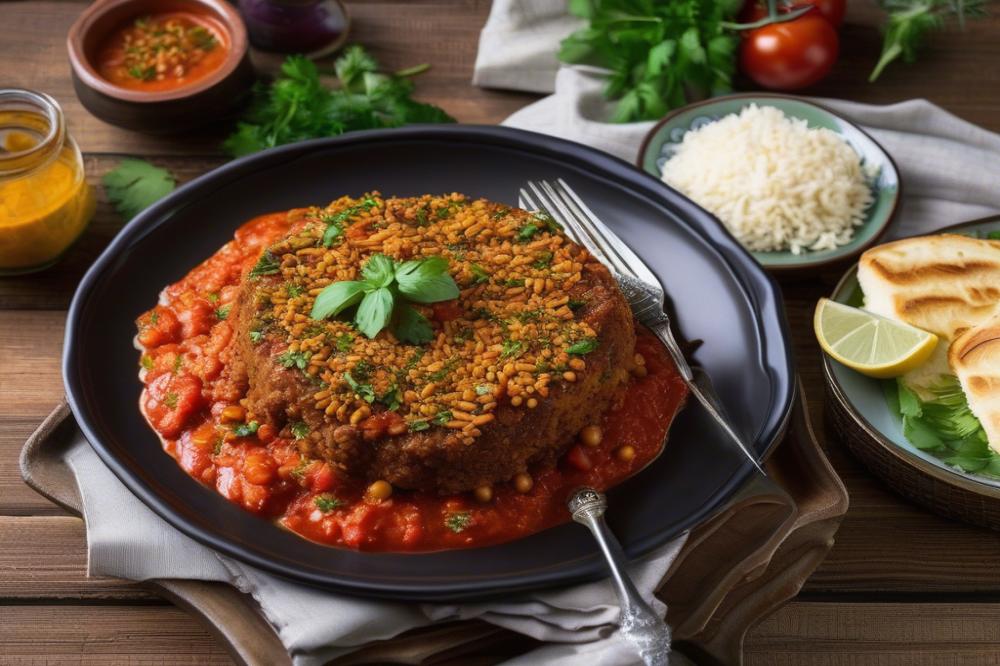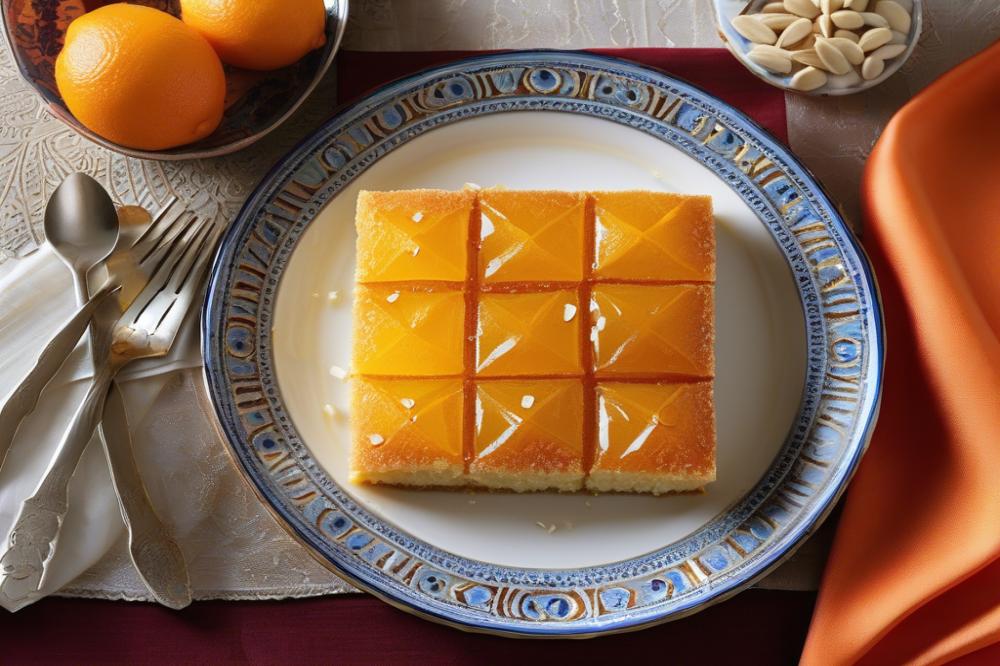Delicious Moroccan Mezza: small plates Inspired by Tradition
Moroccan Mezza holds a special place in the heart of Moroccan cuisine. These small plates showcase the rich traditions and diverse flavors found in North African food. Much like the Spanish tapas, the concept revolves around sharing, making meals a social event rather than just a time to eat. Families and friends come together to enjoy different appetizers, sparking lively conversations over a mezze platter filled with an array of dishes.
The vibrant flavors of each dish play a critical role in this culinary tradition. Every bite bursts with spices, herbs, and textures that tell a story of the region’s history. From zesty dips like zaalouk to aromatic stuffed vegetables, the offerings are both diverse and satisfying. Notably, many vegetarian options shine on these platters, ensuring everyone finds something to enjoy. Dishes can incorporate seasonal vegetables, legumes, and grains, appealing to various tastes.
Sharing plates encourages a communal experience. Diners can appreciate the artistry behind each dish while discovering new flavors together. Traditional dishes often emphasize local ingredients and family recipes passed down through generations. This connection to heritage makes Moroccan Mezza even more special, creating bonds among those dining together.
Bringing people together with food is a beautiful aspect of Moroccan culture. Offering an assortment of flavors invites curiosity and exploration. This lively atmosphere makes enjoying small plates a truly unforgettable experience, where every meal feels festive. Moroccan Mezza is more than just food; it’s a celebration of culture and togetherness.
Understanding Moroccan Mezza

Moroccan Mezza refers to a collection of small dishes that highlight the rich flavors of North African food culture. It often includes a variety of appetizers served together on a mezze platter. Diners can enjoy several bites, making the entire meal feel more communal and engaging.
The concept is similar to Spanish tapas, where sharing plates promote a sense of togetherness. Each small plate in Moroccan cuisine offers a glimpse into traditional dishes. Ingredients such as spices, herbs, and fresh vegetables often take center stage.
Mezza allows for a diverse culinary experience. The vibrant flavors found in these dishes stimulate the palate. Some options are vegetarian, appealing to those who follow plant-based diets. Classic favorites might include zaalouk, a smoky eggplant salad, or spicy carrot salads.
Within Moroccan culture, food plays a vital role, especially in gatherings. Guests are encouraged to mix and match different plates. This style of eating reflects the hospitality deeply rooted in the culinary tradition. Enjoying various tastes encourages connection and dialogue among people at the table.
Each item served has its own unique story and significance. Traditional spices such as cumin and coriander not only enhance flavor but also illustrate the country’s history. Each bite takes you on a journey through time, connecting modern diners with ancient culinary practices. As such, indulging in mezza is not only about eating; it’s an experience that celebrates Moroccan heritage.
Classic Moroccan Mezza Recipes

Zaalouk
Ingredients:
- 2 medium eggplants, diced
- 2 medium ripe tomatoes, chopped
- 3 cloves garlic, minced
- 1 teaspoon ground cumin
- 1 teaspoon paprika
- 3 tablespoons olive oil
- Salt and pepper, to taste
- Fresh parsley or cilantro, for garnish
Cooking Instructions:
- Start by grilling the diced eggplants until soft and smoky. Set aside.
- Heat olive oil in a skillet over medium heat and sauté garlic until fragrant.
- Add chopped tomatoes along with cumin and paprika. Cook until tomatoes soften.
- Mix in the grilled eggplant. Let this all simmer for about 15 minutes. Stir occasionally.
- Season with salt and pepper, and garnish with fresh herbs before serving.
Preparation Time: 30 minutes.
This dish is delightful served warm or at room temperature as part of a mezze platter.
M’semen
Ingredients:
- 2 cups all-purpose flour
- 1 teaspoon salt
- 1 teaspoon sugar
- ¾ cup water
- 1/4 cup semolina
- 1/4 cup melted butter or ghee
Cooking Instructions:
- Combine flour, semolina, sugar, and salt in a mixing bowl.
- Add water gradually. Knead until smooth, about 10 minutes.
- Divide dough into small balls and let rest for 20 minutes.
- Flatten each ball and spread melted butter on the surface. Fold into squares.
- Cook in a hot skillet until golden brown on both sides, about 3-4 minutes.
Preparation Time: 45 minutes.
These flaky pancakes serve as perfect sharing plates alongside stews or dips.
Spiced Olives
Ingredients:
- 2 cups green olives, pitted
- 1 tablespoon orange zest
- 1 tablespoon lemon juice
- 2 cloves garlic, smashed
- 1 teaspoon chili flakes
- 2 tablespoons fresh herbs (thyme or oregano)
- 1/4 cup olive oil
Cooking Instructions:
- In a bowl, combine olives, orange zest, lemon juice, and garlic.
- Sprinkle in chili flakes and fresh herbs. Mix well.
- Drizzle olive oil over the mixture and toss until evenly coated.
- Allow the flavors to meld for at least 30 minutes at room temperature.
Preparation Time: 10 minutes, plus marinating time.
These olives are a flavorful addition to any appetizer spread or tapas selection.
Nutritional Information
Each ingredient used in these traditional dishes offers various health benefits. For instance, eggplants are low in calories and high in fiber, promoting heart health. Whole olives are rich in healthy fats and antioxidants. Flaxseeds and semolina provide essential nutrients, while fresh herbs enhance both taste and nutrition.
These recipes also present wonderful vegetarian options, making them suitable for diverse dietary needs. An emphasis on fresh ingredients and spices reflects the vibrant flavors of North African food.
Creating Your Own Moroccan Mezza Platter

Building a mezze platter is an exciting way to explore Moroccan cuisine. Start with a variety of small plates. Include dips like hummus, baba ghanoush, and zaalouk. These flavorful spreads are perfect for dipping fresh bread or pita.
Next, add some appetizers to your selection. Moroccan meatballs, spiced chicken skewers, or kefta can create a delicious focal point. For those preferring lighter fare, include a mix of vegetarian options. Stuffed grape leaves, roasted vegetables, or tabbouleh add freshness and crunch. Varied textures are important here, so consider adding crispy pastries like briouats.
When selecting traditional dishes, balance is key. Combine rich with light, spicy with mild. Each bite should offer a new experience. For example, pair a creamy dip with crunchy vegetables or warm bread. Accompany hearty options with refreshing salads to cleanse the palate. Sweets can also play a role in this ensemble. Consider adding some date rolls or almond pastries filled with honey.
Presentation matters in creating a lovely experience. Use colorful dishes to truly showcase North African food’s vibrant flavors. Arrange the plates in an inviting manner. Garnishes like fresh herbs or pomegranate seeds can add a beautiful touch. Consider using a large wooden board to display your assortment. This invites guests to serve themselves and enhances the sharing plates concept.
Moreover, drinks play an important part in the experience. A refreshing mint tea served hot can be the perfect traditional beverage. If your guests prefer something cold, try serving sparkling water or a citrus-infused lemonade. For those who enjoy wine, a light rosé or fruity red can complement many flavors.
Putting these elements together creates a memorable meal. Every dish on your platter tells a story, connecting to Morocco’s rich culinary tradition. Enjoying a Moroccan mezza platter is not just about food; it’s about coming together and sharing flavorful moments.
Exploring Vegetarian and Vegan Options
Moroccan Mezza is a treasure trove of vegetarian delights. Many traditional dishes reflect the rich culinary tradition of Morocco while catering to plant-based diets. Fresh vegetables, legumes, and grains play a central role in these small plates.
One of the favorite appetizers is the zaalouk, a smoky eggplant salad mixed with tomatoes and spices. It highlights the use of garlic, cumin, and paprika, creating a burst of vibrant flavors that dance on the palate. Another popular choice is chickpea salad, which combines chickpeas, fresh herbs, and a drizzle of lemon juice. This dish is both hearty and refreshing.
Tabbouleh is also a great option, showcasing finely chopped parsley, tomatoes, and bulgur. It’s dressed with olive oil and lemon, making it a bright addition to any mezze platter. Each bite speaks to the essence of North African food while satisfying guests with various tastes and preferences.
For those seeking warmth and comfort, harira offers a delightful experience. This tomato-based soup often includes lentils, chickpeas, and a medley of spices, making it soul-satisfying and rich in flavor. Often enjoyed during Ramadan, it is a symbol of hospitality in Moroccan cuisine.
Spices and herbs take center stage in these dishes. Coriander, mint, and saffron are common in many recipes. They bring out the best in vegetables and elevate simple ingredients into something extraordinary. Whether it’s the heat of harissa or the sweetness of cinnamon, these flavors enhance every plate.
Sharing plates are a pivotal aspect of enjoying Moroccan cuisine. Meals create a sense of togetherness, encouraging diners to sample different options. A mezze platter brimming with colorful dips and salads invites everyone to dig in. This style of dining fosters conversation and connection.
Another favorite is stuffed bell peppers filled with spiced rice and vegetables. This dish is both colorful and nutritious, making it visually appealing. The combination of textures and tastes showcases the versatility of vegetarian options in Moroccan culture.
Moroccan cuisine effortlessly incorporates plant-based ingredients. With creativity in preparation, each dish reflects a deep respect for tradition and flavor. Everyone can find something to enjoy among these tantalizing offerings.
The Joy of Moroccan Mezza
Experiencing the joy of small plates is a communal affair that brings people together around shared flavors and stories. Each dish becomes a conversation starter. Friends and family gather around, enjoying a vibrant spread of delicious bites. The colors and aromas create an inviting atmosphere that encourages laughter and connection.
Creating your own mezza at home invites endless possibilities. Why not try making a variety of dips and salads? Recipes can often be simple. Ingredients such as fresh vegetables, herbs, and spices are key. You may find that preparing these dishes becomes a delightful project. Invite your loved ones to join in on the fun. Exploring these culinary traditions is not just about the food; it’s about the memories made while preparing it together.
Moroccan cuisine holds a special place in the hearts of many. Its rich history and flavors derive from a blend of cultures. Small plates reflect a spirit of hospitality and the joy of sharing. Just like Spanish tapas, Moroccan mezza celebrates the experience of dining with others. It nourishes not only the body but also the soul.
In the end, mezza is more than just a meal. It is a celebration of life and community. The appeal of these small dishes endures through generations. Embrace the opportunity to explore this culinary tradition. Preparing Moroccan-style dishes at home can lead to joyous occasions filled with laughter and connection. Enjoy the journey of flavors and the shared moments they bring.



